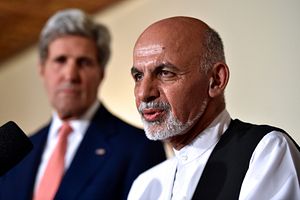After almost three months in office, the experimental national unity government of Afghanistan, with rivals Ashraf Ghani and Abdullah Abdullah sharing the roles of president and chief executive respectively, has yet to appoint a cabinet. Disagreements between the two men and between their respective camps of supporters have ensured that the process of setting up a federal cabinet has been effectively gridlocked. On Tuesday, members of Afghanistan’s Wolesi Jirga, the lower house of the country’s bicameral parliament, told the Ghani administration that should it not appoint a cabinet by Wednesday, the Jirga would use its constitutional authority to create one.
Mohammad Mohaqiq, the deputy chief executive, told Afghanistan’s TOLO News that Ghani and Abdullah had agreed on “key points,” including ethnic quotas. “The ethnic-based composition of the cabinet has been finalized and it will be announced soon,” Mohaqiq said. The Wolesi Jirga’s message to the government comes after a group of Afghan civil society protesters symbolically gathered to form a cabinet of 26 people. They said that the lack of a federal cabinet was responsible for “causing economic stagnation and deteriorating security conditions” across the country. “The government is pretending that the delay in announcement of the cabinet is due to a search for special individuals, but in reality, the entire problem is due to personal, group and tribal issues,” one activist told TOLO News.
The Taliban similarly took the lack of a federal cabinet as an opportunity to criticize the effectiveness of the national government. The group, however, did not take its typical tone with the criticism. It mocked Ghani and Abdullah’s failure to come to an agreement via a post on the insurgent group’s Twitter page, noting that “Perhaps the cabinet is frozen!” The tweet linked to an article authored by Taliban spokesman Zabihullah Mujahid noting that Ghani and Abdullah had “no convincing excuse for the failure to name a cabinet.” “They might as well blame the freezing weather in Kabul,” Zabihullah quipped in his article. The Taliban’s tweet was part of a general onslaught of cartoons and humorous tweets directed at the government for its inability to form a cabinet.
The national unity government was a last-ditch solution to months of post-election gridlock between rival presidential candidates Ghani and Abdullah. Following a series of allegations of corrupt practices during Afghanistan’s presidential run-off election, the two rivals agreed to a U.S.-brokered power-sharing deal in which Ghani would take over as president and Abdullah would assume a newly created chief executive officer position. While the power-sharing agreement fast-tracked a resolution to Afghanistan’s historic presidential election, which marked the country’s first-ever democratic transition of power, it left the future governance of the country in question. As the federal cabinet issue demonstrates, disagreements endure between the president and the chief executive, resulting in delays that could negatively impact the country’s journey toward peace and stability.

































